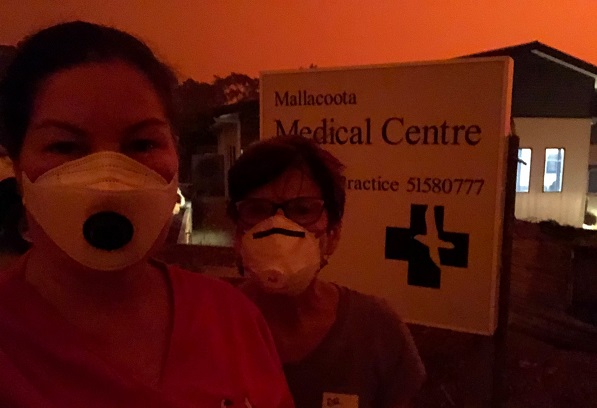From the President: January 2020
Español Français 中文
The tragedy which unfolded in Australia over the last weeks has brought devastation to a beautiful country. Our condolences were sent to our WONCA family members, the Royal Australian College of General Practitioners (RACGP) and the Australian College of Rural and Remote Medicine (ACRRM).
See more here
The fires rage on as I write this. The consequences are yet to be fully understood. I am reminded of the recent discussion at our Executive meeting in November 2019, when we endorsed a statement from the
WONCA Working Party on the Environment about the climate emergency.
In the Statement on climate emergency, the Working Party reiterated the potential impacts of the climate crisis on population health, through the effects on the supply of clean air, safe drinking water and crop yields, as well as the impacts from extreme weather, heat and cold stress and air pollution. The fires burning across Australia make that emergency very real for many people.
WONCA recognizes that each of us has a responsibility to contribute to reducing the climate emergency in our own environments and more widely. It is increasingly ‘mainstream’ to talk about climate issues as part of the narrative in community planning and development. That ‘normalisation’ of the discussion is a good thing but it is not nearly enough.
At my invitation, in February 2019, Professor Sir Andy Haines contributed an
‘In my view…’ article to
WONCA News, urging family doctors to get involved in planetary health. He highlighted the recent publication of the ‘Declaration calling for the family doctors of the world to act on planetary health’, a result of the collaboration between the WONCA Working Party on the Environment and the Planetary Health Alliance Clinicians for Planetary Health Working Group (
see Declaration ).
The joint Declaration highlighted the risks to health of environmental change but, importantly, it also focused on the opportunities open to family doctors, for intervention to reduce the potential impacts and to tackle the driving forces responsible for negative environmental changes.
 Photo: Doctors take a photo break in daytime, outside Mallacoota Medical Centre, Victoria, Australia (with permission)
Photo: Doctors take a photo break in daytime, outside Mallacoota Medical Centre, Victoria, Australia (with permission)
Family doctors are frequently among the first responders to environmental disasters and emergencies. Even more challenging, though, is that it is family doctors who are the clinical professionals left to manage the aftermath of such disasters and emergencies. The ‘first in, last out’ phrase holds true in this case. The physical and mental health repercussions of environmental disasters live on in communities for many years, affecting successive generations. Successive generations of family doctors continue to provide care and treatment.
Let’s not forget the impact of environmental disasters on the family doctors themselves. They are not immune from the risks around them or the effects of environmental disasters. They can, however help to mitigate some of the risks by informing and educating their patients and by contributing to community-based risk reduction programmes.
What I wrote in my column in August 2019 has at least as much resonance today, as the current environment disaster unfolds in Australia and flooding threatens numerous areas of Indonesia … ‘Risk reduction and preparedness, through active community participation, will help to alleviate concerns and ensure that a range of professionals are resilient to crises, should they arise. Working together, across professions and community groups, and having a plan in place, ensures that action can happen quickly to reduce risks for professionals and the communities in which they work, irrespective of the crisis situation they face’.
The crucial role of family doctors in disaster risk reduction and in disaster preparedness is increasingly being recognised at national and global levels. Training for mitigating the devastating effects of a disaster once it has happened, or for contributing to the prevention of disaster, is limited and, in some countries, non-existent. Yet, disaster preparedness and risk reduction initiatives are key to communities understanding and being informed about the actions they should and should not take in different emergency scenarios.
As this latest environmental disaster carves scars across the beautiful country of Australia, let us all, as family doctors, respond by engaging more fully in local, national and global initiatives to mitigate environmental risks and challenges. As trusted and respected members of communities, family doctors can improve their knowledge and understanding of environmental risks and can, through their consultations and engagement with community groups, communicate those risks and opportunities for mitigating them.
The occurrence of environmental disasters is escalating. No-one wants to scare individuals or communities. But keeping quiet and hoping that environmental changes are not presenting us with clear and identifiable risks would be wrong. Through small individual actions and in larger policy-making opportunities, family doctors have both an opportunity and a responsibility to speak up for our patients’ health and the risks faced by environmental change.
Donald Li
President